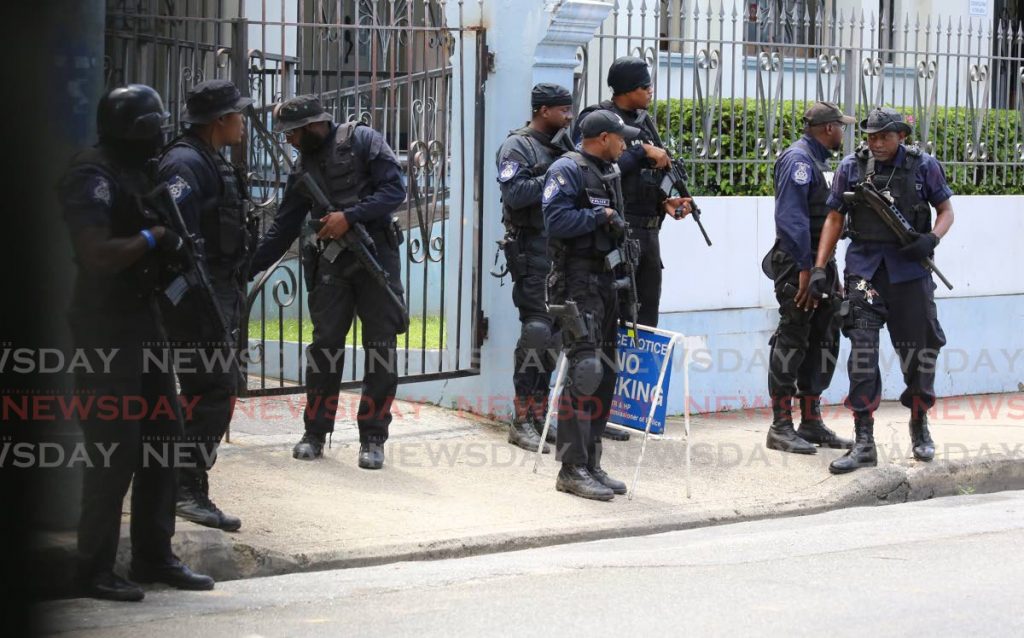Government wants to give anti-gang law more teeth

SHANE SUPERVILLE and JENSEN LA VENDE
Government is looking at broadening the category of offences under the anti-gang legislation to catch fraudsters, rapists, armed robbers and burglars.
The Anti-Gang Act which is set to expire on November 15, requires the support of the Opposition in Parliament for extension.
Speaking with Newsday on Sunday, both the Attorney General and the Minister of National Security said while they were confident the legislation if renewed would go a long way in the fight against crime, it hinged on the support of the opposition.
Contacted for comment, Oropouche East MP and shadow minister of national security for the opposition Dr Roodal Moonilal said both he and his colleagues were willing to support the legislation once it had the requisite checks to prevent against abuse by the authorities.
Citing the opposition’s support for the Foreign Account Tax Compliance Act (FATCA) legislation which was implemented to prevent offshore tax abuses, Moonilal said the opposition has always been supportive of legislation aimed at reducing crime, but felt that a more robust law enforcement system was needed.
“If many people have been arrested and it (Anti-Gang Act) served as a deterrent to crime, we will look favorably at extension once citizens' rights are protected. If it has succeeded in putting gang leaders behind bars, it is worthy of extension.
“Legislation alone can’t fight crime and while we have had anti-gang legislation in place we have not had the dent in crime, not because of law but I think it is because of the paucity, scarcity and neglect of the government in providing the tools to the police.”
Noting the remarks of Opposition Leader Kamla Persad-Bissessar at the budget debate in Parliament last Friday, Moonilal said the extension of the Anti-Gang Act without addressing the needs of the police would be akin to “spinning top in mud.”
The anti-gang legislation gives police greater powers to monitor suspected offenders and keeps them behind bars without bail for 120 days, in the first instance.
Attorney General Faris Al-Rawi said while government would be considering adding new features to strengthen the legislation to tackle an array of offences, it must be carefully balanced with safeguarding the rights of citizens in keeping with the principle of innocent until proven guilty.
Commenting on the need for the extension of the legislation, National Security Minister Stuart Young via WhatsApp said he was pleased with the performance of the police and Office of the Director of Public Prosecutions (DPP) in using the legislation, noting that in addition to criminal charges being laid against suspects, investigations were already launched.
“Other provisions in the legislation that have been used are detention orders allowing the police to hold individuals for longer periods whilst gang investigations are ongoing and warrant provisions.
“There are many investigations ongoing across the country in every division targeting gangs and gang activity which are utilising the various provisions of this particular law.
“The DPP has advised on a number of criminal charges that have been laid using the legislation and continues to actively support ongoing investigations which may use provisions of the anti-gang legislation.”
Young said that government would also be considering amendments to the legislation suggested by the police.
Police Commissioner Gary Griffith confirmed that correspondence was sent to the Office of the Attorney General hoping for the law to be amended.
In the letter, the officers, who represented the Strategic Services Agency (SSA), Homicide Bureau, Cyber Crime Unit, Organised Crime and Intelligence Unit (OCIU) highlighted both the benefits and downfalls of the existing legislation as they work to enforce the Anti-Gang Act.
“A large number of homicides are indeed gang-related. In the circumstances this speaks to the very heart of the immense usefulness of the Anti-Gang legislation as an integral tool in law enforcement’s fight against organised crime. It is thus of critical importance that the relevant legislators understand the importance of this legislation in aiding to rid the nation of this scourge.”
The letter highlighted a case where, for months, officers had no leads except shell casings and partial fingerprint. After some time investigating “with no key leads or clear pathway to successfully solve this homicide” it was unearthed that the killing was a contracted hit ordered from a gang leader inside the prison. This resulted in people being charged not only with murder but with gang-related offences as well.
Al-Rawi said he was confident in the ability of the police in tackling organised crime if the legislation was extended.
He said while violent crimes continued to be a concern for him, he was optimistic the police through its intelligence-gathering and prosecutorial arms were capable of pursuing criminals at all levels, especially white-collar crime.
“One death, one murder, one bit of gang activity what I can say is that TT appears to be slowly but surely sobering itself up into compliance. I am always generally optimistic that the hard work, efforts and faith that better days are ahead.
“What I can say is that we will continue to toil to do what we have to do to improve the structures but I want to remind you that the approach that this government has taken has been radically different from every other government we have not only passed law, we have operationalised law.”
Noting the arrests of five men last week under the anti-gang legislation, Al-Rawi said the law was robust as it has been applied to people who were suspected of committing a variety of offences.
“Those matters are now cross-jurisdictional, they are gang and home invasion, gang and sexual offences, gang and trafficking in trafficking in children so there is significant utilisation of this law across criminal offence categories.”


Comments
"Government wants to give anti-gang law more teeth"